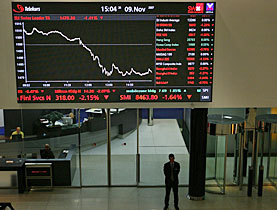
UBS offers reassurance amid gloomy forecast

UBS has launched a campaign to persuade shareholders to accept a multi-billion franc foreign investment rescue package, but warned of rocky times ahead.
Stakeholders at Switzerland’s largest bank will vote on February 27 whether to accept SFr13 billion ($11.8 billion) from Singapore and the Middle East after suffering huge subprime losses.
UBS issued a letter to shareholders on Friday explaining why the bank wrote off SFr4.2 billion last October and a further SFr11.3 billion two months later as the United States mortgage market went into meltdown.
The letter, signed by chairman Marcel Ospel and chief executive Marcel Rohner, then set out the case for taking the emergency funding despite offering generous terms of repayment and diluting shares.
Late last year, some shareholder groups hinted at a rebellion and demanded a full account of the bank’s risk taking procedures before the crisis struck.
Bank Sarasin analyst Rainer Skierka said UBS was attempting to “build bridges” with discontented smaller shareholders in Switzerland who had been forced to read about the bank’s problems in newspapers last year.
“If these thousands of retail shareholders get worried then it adds further negative sentiment to the bank,” he told swissinfo.
Uncertain market
The bank strongly hinted that rejecting the deal would not only weaken its reputation but also leave it exposed if conditions deteriorated further.
“During 2008, the environment for financial markets, especially in the US, is uncertain, and we need to manage through this period from a position of financial strength,” the letter stated.
The bank added that it could not, at this time, accurately predict how the financial markets would develop during the year or the effect on its outstanding $29 billion exposure to subprime related investments.
“However, we are confident that, after the proposed capital improvement, our capital position would remain strong even if the conditions in the US housing market were to continue to deteriorate to levels below those that are currently anticipated.”
Nothing sinister
Shareholders should not be concerned at giving the Singapore government a nine per cent in the bank as part of the deal, according to Roman Scott, based in the city-state as managing director of investment advisory firm Calamander Group.
“There is a rising sensitivity in the West about sovereign funds as everyone knows there is a government sitting behind them. But there is no talk in the region of a deep, dark political strategy to take UBS over or to influence their board or strategy – it is seen as a smart opportunistic investment on excellent terms,” he told swissinfo.
“Singapore does not need ownership of the biggest wealth managers to boost its ambitions of becoming a wealth management centre that rivals Switzerland – it has already happened. The Singapore government has stakes in other banks too, so it does not make much of a difference.”
swissinfo, Matthew Allen in Zurich
UBS endured a stormy 2007, starting with the collapse of its hedge fund Dillon Read Capital management. Two months after that, in July, chief executive Peter Wuffli abruptly departed without clear explanation.
In October of last year, UBS said it would cut 1,500 jobs in its investment banking arm, including its head Huw Jenkins. UBS chief financial officer, Clive Standish, also left at the same time.
Later that month the bank announced it was writing off SFr4.2 billion on subprime losses and SFr726 million pre-tax loss for the third quarter – the first quarterly loss in nine years.
In December, UBS said another $10 billion (SFr11.3 billion) would be written off as the US subprime crisis deepened.
The Government of Singapore Investment Corporation (GIC) is a global investment management company established in 1981 to manage Singapore’s foreign reserves.
It has negotiated a SFr11 billion investment of UBS mandatory convertible notes with a 9% coupon that will convert into a 9% stake in the bank within two years.
GIC also has stakes in a number of other financial institutions, both domestic and foreign banks such as Standard Chartered Bank, Barclays Bank and Merrill Lynch.
The other unnamed investor from the Middle East proposes an investment in UBS of SFr2 billion. UBS shareholders will vote on the combined deal in February.

In compliance with the JTI standards
More: SWI swissinfo.ch certified by the Journalism Trust Initiative





























You can find an overview of ongoing debates with our journalists here . Please join us!
If you want to start a conversation about a topic raised in this article or want to report factual errors, email us at english@swissinfo.ch.